Gulf Cooperation Council, US Urge Iran To Fully Cooperate With IAEA
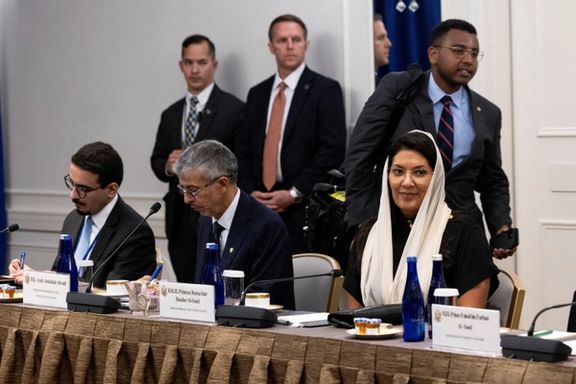
Gulf Cooperation Council (GCC) countries and the US renewed calls for Iran to fully cooperate with the International Atomic Energy Agency (IAEA), in a joint statement.

Gulf Cooperation Council (GCC) countries and the US renewed calls for Iran to fully cooperate with the International Atomic Energy Agency (IAEA), in a joint statement.
The statement came after a meeting of the GCC Arab foreign ministers, the US Secretary of State and GCC Secretary-General in New York.
Iran barred multiple International IAEA's inspectors assigned to oversee Tehran's atomic activities in a move described by the UN nuclear watchdog chief, Rafael Grossi, as "disproportionate and unprecedented."
Iran's move was a response to a call led by the United States, Britain, France and Germany at the IAEA's Board of Governors meeting last week for Tehran to cooperate immediately with the IAEA on issues including explaining uranium traces found at undeclared sites.
Despite talks since President Joe Biden assumed office, the United States has not been able to bring Tehran to agree to a new nuclear agreement, after former President Donald Trump left the JCPOA accord and imposed sanctions on Iran.
Iran’s controversial nuclear program that has been expanding at a faster pace since early 2021, is a source of great concern for its regional Arab neighbors. Tehran has long been projecting power throughout the Middle East and the Persian Gulf, arming and supporting militants and intimidating shipping in the strategic waters of the region.
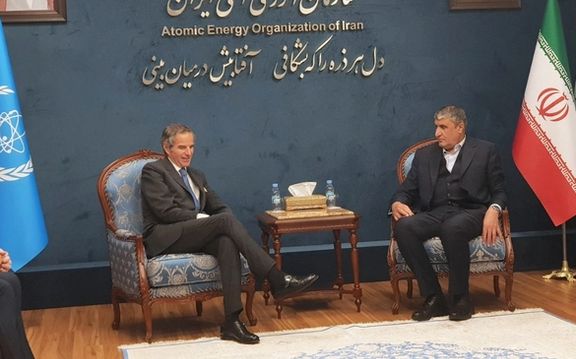
Following Iran's move to bar IAEA inspectors from monitoring its nuclear activities, a hardliner close to the Supreme Leader has once again called for leaving the NPT.
Earlier on Monday, the US and E3 (The United Kingdom, France and Germany) issued a statement condemning Iran's move a few days after the IAEA announced that Iran has withdrawn the designation of several UN inspectors assigned to conduct verification activities in Iran under the Non-Proliferation Treaty Safeguards Agreement.
According to conservative website Alef in Tehran, Hossein Shariatmadari, the editor of the Kayhan daily which is funded by Khamenei's office, wrote: "The United States has currently under no obligation about the JCPOA. At the same time, Europe has neither acknowledged nor fulfilled any one of its commitments under the nuclear deal. It is only Iran that has made so many concessions and brought its nuclear facilities on the brink of destruction despite enduring decades of economic and political pressure and is also expected to accept further commitments if it continues its presence in the JCPOA."
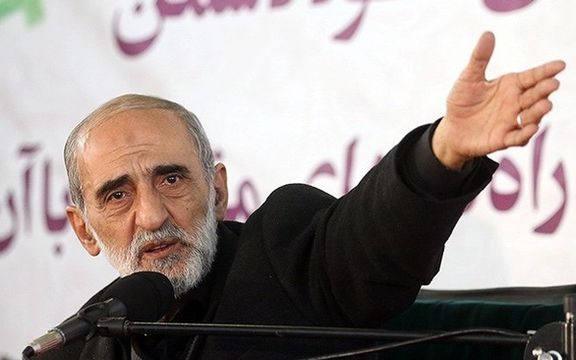
Shariatmadari further claimed that "the Raisi administration has heroically resisted against powerful countries and the United States' arrogance and has even humiliated them at times." He referred to the recent comments by the Iranian foreign minister in which he said, "Iran will not leave any hostile act by the United States without a response."
He added that "Iran's presence in the NPT is detrimental to Iran and provides an opportunity to the enemies to blackmail Tehran and hinder its progress." He asked: "Why should Iran remain in the Non-Proliferation Treaty while the United States refuses to fulfil its commitments and China and Russia have no objections to Iran's withdrawal from the treaty?"
Shariatmadari's comments came hours after the US and three European allies condemned Iran’s move to bar IAEA inspectors, considering it another step in the wrong direction. IAEA Director Rafael Grossi characterized Tehran's move as non-constructive, adding that it was not a step in the right direction.
Grossi emphasized that the only way that Iran could dispel any doubts about its nuclear program is to allow the IAEA to inspect, noting that “If they allow us to work, then there will be confidence; otherwise, it will be very complicated.”
Meanwhile, Iranian analyst Ali Bigdeli warned that barring the IAEA inspectors would pave the way for the issuance of a UN Security Council resolution against Iran. He added that Iran's move will not lead to the revival of the JCPOA, as the next meeting of the agency is likely to issue a warning to Iran and send the case to the UN Security Council.
Bigdeli noted that in the previous cases, Iran used to show some flexibility and offer concessions to the IAEA to prevent the issuance of a resolution. Last week, 24 countries that are members of the IAEA in a statement assessed Iran's cooperation with the agency as "insufficient." In response, the Iranian Foreign Ministry branded IAEA experts as "illiterate" and denied that Tehran had refused to cooperate with the UN nuclear watchdog.
Media expectations suggest that President Ebrahim Raisi is likely to face tough questions in New York during the UN General Assembly, as politicians and reporters will certainly ask him about this development and its timing, especially after some of Iran's frozen assets abroad have been released.
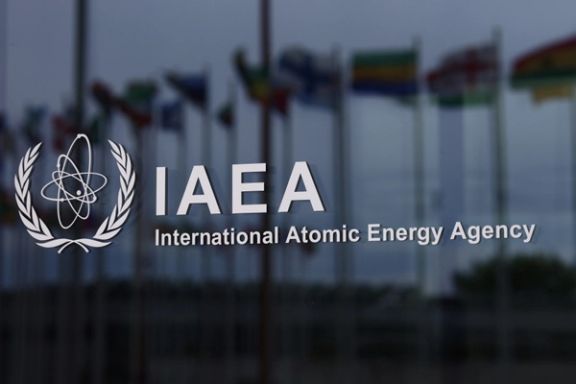
The US and three European allies have condemned Iran’s move to bar IAEA inspectors assigned to the country as another step in the wrong direction.
The United Kingdom, France, Germany -- the so-called E3 -- and the US issued a statement Monday, a few days after the UN nuclear watchdog announced that Iran has withdrawn the designation of several UN inspectors assigned to conduct verification activities in Iran under the Non-Proliferation Treaty Safeguards Agreement.
Having arrived in New York for the UN General Assembly, IAEA director Rafael Grossi told Iran International’s Arash Alaei Monday that he hopes to meet with Iranian officials “to see if they can regress” this unconstructive move. “I was very critical of this move... it was not constructive; it’s not a step in the right direction. it's not good."
He added that the only way that Iran could dispel any doubts about its nuclear program is to allow the IAEA to inspect, noting that “If they allow us to work, then there will be confidence; otherwise, it will be very complicated.”
Via a rare public statement, International Atomic Energy Agency's Rafael Grossi had decried Iran's "disproportionate and unprecedented" move on September 16, saying that it hinders IAEA oversight of Tehran's atomic activities. Tehran was showing displeasure in the face of a threat by the US and the E3 of another resolution to censure Iran for lack of cooperation with the IAEA.
In their Monday statement, the US and its allies said, “Iran’s actions will undermine the Agency’s ability to carry out its safeguards mandate effectively,” which constitutes an unnecessary blow to an “already strained relationship between the IAEA and Iran”.
Expressing concern over Iran expanding its nuclear activities, and its deliberate hampering of IAEA’s verification and monitoring activities – mandated under Iran’s NPT Safeguards Agreement, the US and E3 joined Grossi in strongly condemning "unilateral” measure.
“This is at a time when the IAEA has serious, longstanding, and unresolved questions related to undeclared nuclear materials and activities in Iran that Iran has failed to address for more than four years.”
They urged Tehran to “immediately reverse these inspector de-designations and fully cooperate with the Agency to enable them to provide assurances that Iran’s nuclear program is exclusively peaceful.”
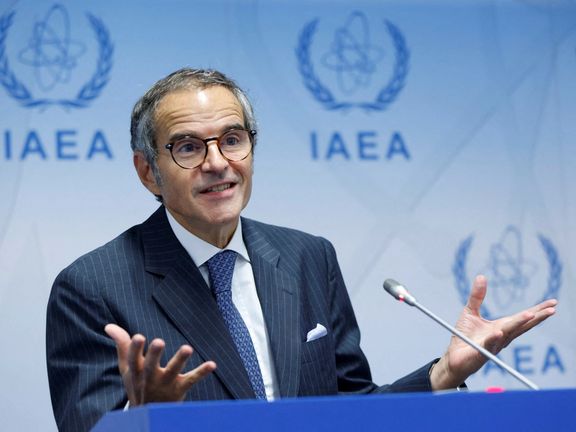
On Sunday, the European Union also urged Iran to reconsider its decision, with the spokesman for EU foreign affairs Peter Stano saying, "The European Union is highly concerned by the ... decision by Iran to withdraw the official designation of several experienced IAEA inspectors to monitor and verify its nuclear program."
"Particularly worrying is the direct and severe impact of this decision on the Agency's ability to conduct its verification activities, which includes the monitoring of the Joint Comprehensive Plan of Action. The EU urges Iran to reconsider its decision without delay," the statement said.
Earlier in the day, US Secretary of State Antony Blinken acknowledged the threat posed by Iran’s nuclear program during a meeting with foreign ministers of the Persian Gulf Cooperation Council member states, who are also in New York for the UN summit.
“We’re cooperating to deter Tehran’s aggression and destabilizing activities, including the threat posed by its nuclear program,” he said, adding, “And we’re working to uphold freedom of navigation, such as through a multinational task force that is protecting ships in the Strait of Hormuz.”
In June, the US Naval Forces Central Command hosted a two-day multilateral maritime security meeting for 90 senior military officers and diplomats from 22 nations, including GCC member-states. The counterterrorism working group and the Iran working group are two of the most active bodies set up under the umbrella of GCC-US partnership.
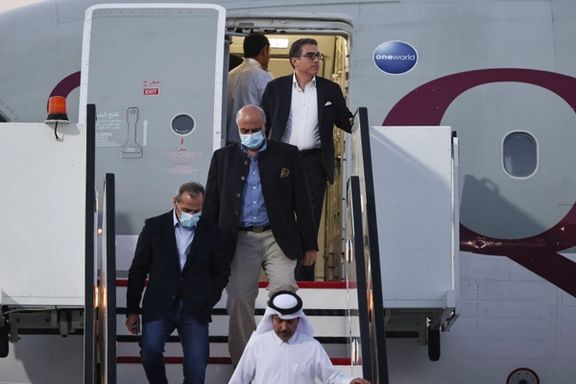
US President Joe Biden issued a statement Monday announcing the release of five Americans who were held hostage in Iran but were freed and flown to Qatar.
"Today, five innocent Americans who were imprisoned in Iran are finally coming home," the statement said and added, "I am grateful to our partners at home and abroad for their tireless efforts to help us achieve this outcome, including the Governments of Qatar, Oman, Switzerland, and South Korea."
US officials received the five freed Americans released by Tehran after they disembarked from a Qatari plane at Doha international airport on Monday, a Reuters witness said.
Secretary of State Antony Blinken said he had spoken to the US citizens after they left Iran and flew to Doha as part of a prisoner swap. "I can tell you that it was for them, for me, an emotional conversation,” he said, adding that "President Biden has demonstrated that he is prepared to make tough and difficult decisions.”
"This process, and the engagements necessary to bring it about, the freedom of these unjustly detained Americans has always been a separate track in our engagement, or for that matter our lack of engagement, with Iran. So, irrespective of what is happening or not happening with respect to a return to the nuclear agreement, we have been working independently to bring these Americans home,” he noted. "We will continue to take whatever step is necessary to deal with actions by Iran in a whole host of areas that are profoundly objectionable, and that many other countries find objectionable."
Switzerland's ambassador to Iran accompanied them on the plane to Doha, the witness added.
Earlier, the five US detainees had flown out of Iran in a swap for five Iranians held in the United States, in a rare deal between the arch enemies that also unfroze $6 billion of Tehran's funds.
Earlier in the day, Mohammad-Reza Farzin, chief of Iran's central bank announced that the $6 billion released by South Korea with authorization from the United States was converted into 5.73 billion euros and transferred Monday to six Iranian accounts at two Qatari banks.
Iran's Ministry of Foreign Affairs spokesperson has Nasser Kanaani disclosed on Monday that two of the Iranians released in the United States will return to Iran, one individual will travel to another country, and two others will continue to reside in the US.
The controversial deal, first made public on August 10, is seen as a first step toward an unwritten deal, whereby Iran will reduce high-level uranium enrichment in exchange for more of its frozen funds being released and a lax sanctions regime by Washington.
Republican lawmakers and many Iranian Americans have sharply criticized the deal, calling it the highest ransom paid in history to free five people, which will free up resources for the Iranian regime to spend on weapons and support to militant organizations.
Meanwhile, Iran’s President Ebrahim left Tehran for New York Monday to participate in the UN General Assembly. He is scheduled to hold diplomatic meetings while in New York. Critics of the Biden administration Iran policy also took issue with the decision to allow Raisi to enter the country, while Iran is still under sanctions and expanding its nuclear program.
The US dual citizens to be released include Siamak Namazi, 51, and Emad Sharqi, 59, both businessmen, and Morad Tahbaz, 67, an environmentalist who also holds British nationality. They were released from prison and put under house arrest last month.
A fourth US citizen was also released into house arrest, while a fifth was already under house arrest. Their identities have not been disclosed.
Iranian officials named the five Iranians to be released by the US as Mehrdad Moin-Ansari, Kambiz Attar-Kashani, Reza Sarhangpour-Kafrani, Amin Hassanzadeh and Kaveh Afrasiabi. Afrasiabi who was prosecuted for accepting payments from the Iranian government has apparently decided to remain in the United States.
As a first step in the deal, Washington waived sanctions to allow the transfer of $6 billion in Iranian funds from South Korea to Qatar. The funds had been blocked in South Korea because of US sanctions.
Under the agreement, Doha agreed to monitor how Iran spends the funds to ensure it goes on non-sanctioned humanitarian goods, such as food and medicine.
Meanwhile, Iran announced on Saturday that it has withdrawn accreditation for several UN nuclear inspectors, a move that intensified criticism of Biden’s Iran policy amid freeing the frozen funds. A European Union spokesman on Sunday said the EU is “highly concerned” by Iran’s decision, and asked Tehran to reconsider “without delay.”
With reporting by Reuters
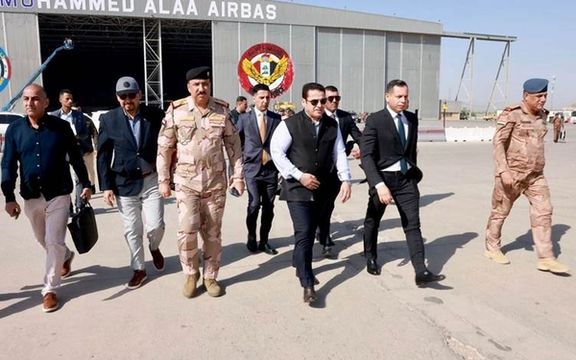
Iraq's top security official is in the Kurdistan autonomous region to oversee the implementation of a security pact with Iran aimed at disarming Kurdish opposition groups.
National security advisor Qasim al-Araji, leading a high-level security delegation, arrived in Erbil, the capital of Iraqi Kurdistan, on Monday, just a day before the September 19 deadline for finalizing the disarmament agreement.
Back in March, during a ceremony attended by Prime Minister Mohammed Shia' Al Sudani in Baghdad, then-Secretary of Iran’s Supreme National Security Council (SNSC), Ali Shamkhani, and his Iraqi counterpart al-Araji signed a joint security cooperation document aimed at curtailing the activities of Iranian-Kurdish militants.
The Kurdistan Regional Government (KRG), which has cordial relations with Tehran, has on several occasions called on neighboring countries and armed Kurdish groups to not use the region’s territory as an arena to settle scores. In July, the Iranian military threatened military action if Iraq failed to meet the deadline.
Tehran has long accused the Kurdistan Regional Government (KRG) of harboring opposition groups labeled as "terrorist" or "anti-revolutionary" and permitting them to use border areas as launchpads for attacks against Iran. These groups claim that their armed campaign aims to "defend the rights of the Kurds" in Iran. The Iranian regime has escalated attacks against Iranian Kurds sheltering in Iraqi Kurdistan, citing "separatist" Kurdish groups as instigating conflict in Iranian Kurdish cities by supporting popular protests.
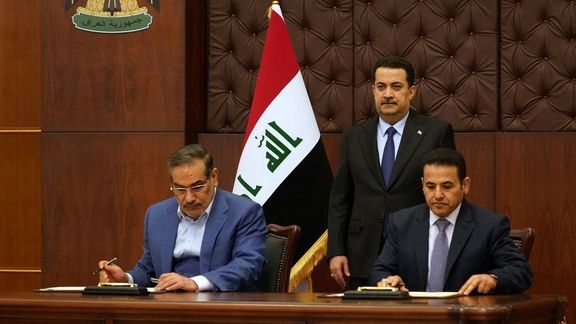
Al-Araji visited Tehran last week "under the direction of the Commander-in-Chief of the Armed Forces, Iraqi Prime Minister Mohammed Shia’ al-Sudani," to discuss tightening security at the border between the two countries. This visit came several days after the Islamic Republic's warnings that cross-border attacks would continue unless Baghdad and Erbil secured the borders. In recent weeks, he has been shuttling between Sulaymaniyah, Erbil, Tehran, and Baghdad to coordinate this effort.
During a joint press conference with his Iranian counterpart Hossein Amir-Abdollahian in Tehran on September 13, Iraqi Foreign Minister Fuad Hussein announced that several groups had already been disarmed, and arrangements were being made to set up camps at an undisclosed location for the relocation of these groups.
Waad Qado, a member of the Iraqi parliament’s security and defense committee, stated on Monday that Iraq had requested an extension of the deadline. Iranian Defense Minister Brigadier General Mohammad Reza Ashtiani, however, said on Sunday that Tehran would not extend the ultimatum, warning Baghdad of an "eleventh-hour decision" on the matter.
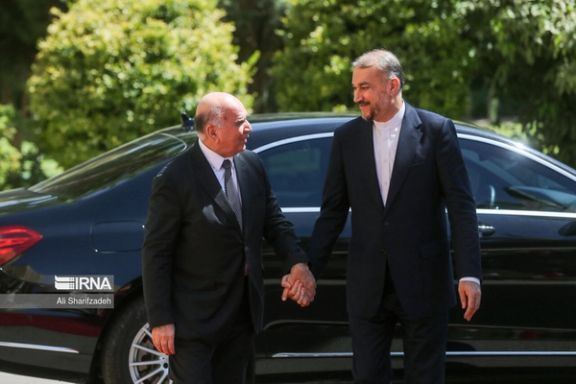
"We do not have any extension [to the deadline]. We will act in due time in accordance with the agreement made [with Iraq]," he said, warning Baghdad of a last-minute assessment of the situation before making the final decision.
The spokesman for Iraq’s Joint Operations Command also said on Sunday that government forces have begun to gain full control over all border points with neighboring Iran, emphasizing that Baghdad is fully committed to implementing the agreement. Major General Tahsin al-Khafaji added, "The step is meant to prevent the use of Iraqi soil to launch an attack on neighboring states, as emphasized in the Iraqi Constitution."
Earlier this month, the ground forces of the Islamic Revolutionary Guard Corps (IRGC) deployed forces to the northwestern borders of Iran.
In general, Kurdish parties, including Komala and the Kurdistan Democratic Party of Iran (KDPI), favor Kurdish autonomy within a federal Iran. On the other hand, Pejak (the Free Life Party of Kurdistan), an affiliate of the Kurdistan Workers’ Party, or PKK, which originated in Turkey but is also based in northern Iraq, generally advocates for a unified, independent Kurdistan uniting Kurds in Syria, Iraq, Turkey, and Iran.

Iran has withdrawn the designation of several inspectors assigned to conduct verification activities in Iran under the Non-Proliferation Treaty Safeguards Agreement.
Rafael Grossi, Director General of UN nuclear watchdog, International Atomic Energy Agency (IAEA), made the rare public statement on Saturday amidst the national rallies taking hold in Iran and abroad around the one-year anniversary of the death of Mahsa Amini.
It is the latest move to stonewall inspectors by the Iranian regime, which just recently withdrew the designation of another experienced IAEA inspector for Iran.
“With today’s decision, Iran has effectively removed about one third of the core group of the Agency’s most experienced inspectors designated for Iran,” Grossi said in a statement.
“This measure, while formally permitted by the NPT Safeguards Agreement, has been exercised by Iran in a manner that affects in a direct and severe way the ability of the IAEA to conduct effectively its inspections in Iran.”
Grossi strongly condemned Iran's "disproportionate and unprecedented unilateral" decision, saying it will affect the IAEA's verification activities in Iran.
He admitted that it is both “a step in the wrong direction” and “constitutes an unnecessary blow to an already strained relationship between the IAEA and Iran in the implementation of the NPT Safeguards Agreement”.
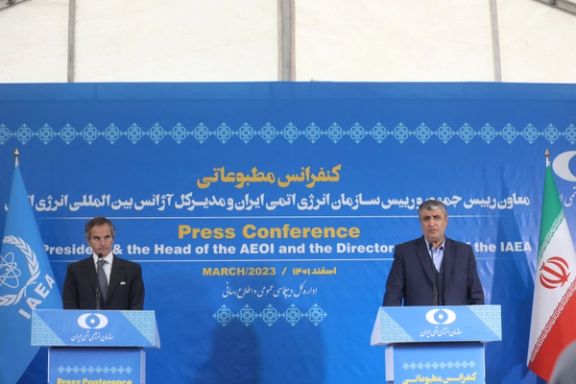
In reaction to the IAEA statement, Iran's Foreign Ministry spokesman said the country's decision to withdraw the designation of several IAEA inspectors is based on its rights under the Article 9 of Iran-IAEA Safeguards Agreement (INFCIRC/214).
Earlier this week, another meeting of the Board of Governors of the IAEA continued with no effective step to address the questions surrounding Iran’s nuclear program.
Iran is known to have expanded its program significantly since 2018, when the United States unilaterally withdrew from the Iran nuclear deal – or Joint Comprehensive Plan of Action (JCPOA).
On Wednesday, three signatories of the deal, UK, France, Germany (E3) delivered a joint statement at the IAEA Board of Governors meeting, in which they condemned Iran’s lack of transparency with regards to its nuclear program.
However, despite their emphasis on Iran’s non-compliance, the E3, much like the US, fell short of introducing measures that would ensure Tehran’s cooperation with the IAEA. On the contrary, just in August the Biden administration agreed to release $6 billion of Iran’s funds blocked in South Korea due to US sanctions, in exchange for five US citizens held hostage in Tehran.
In the State Department’s press briefing Wednesday, Spokesperson Matthew Miller refused to comment on why a resolution condemning Iran’s non-cooperation was not introduced at the IAEA meeting. Pressed by a reporter, Miller said the Biden administration would only work with other members “to clearly express that Iran should cooperate fully with the IAEA.”
This was in line with a joint statement delivered to the IAEA Board of Governors meeting on behalf of the US and 62 other member states, including all EU countries, Turkey, Kuwait and Saudi Arabia.
In January, IAEA inspectors at Fordow detected undeclared centrifuge configuration changes as well as particles of uranium enriched up to 83.7%. In March, Grossi visited Iran and brought back an agreement that was hailed as a breakthrough by both sides but deemed insufficient and non-binding by its critics.
The agreement (or the Joint Statement) stood on the premise that Iran had “expressed its readiness” to “provide further information and access” and “allow the IAEA to implement further appropriate verification and monitoring activities” on a “voluntary” basis.
Six months on, the premise seems to have been shaky at best. According to the IAEA, Iran has accumulated enriched uranium (5-60%) far beyond JCPOA limits
Iran continues enrichment in Fordow, where inspectors detected undeclared particles of uranium enriched at 83.7%.
In Saturday’s statement, Grossi urged the regime to come back to the table. “Without effective cooperation, confidence and trust will continue to be elusive and the agency will not be in a position to discharge effectively its verification mandate in Iran and provide credible assurances that nuclear material and activities in Iran are for peaceful purposes,” he said.






